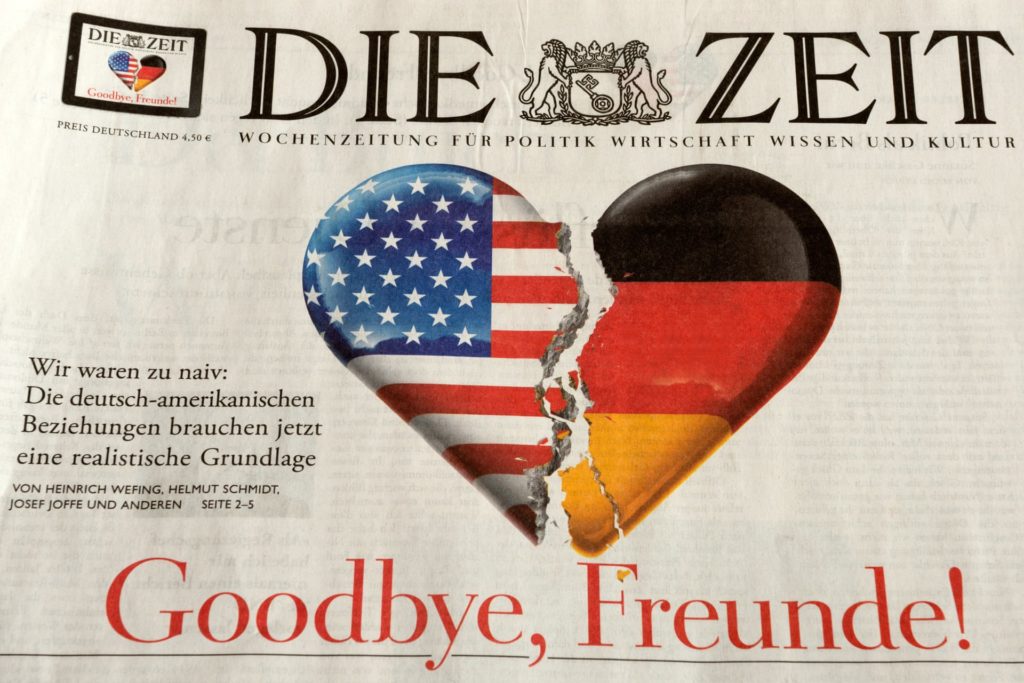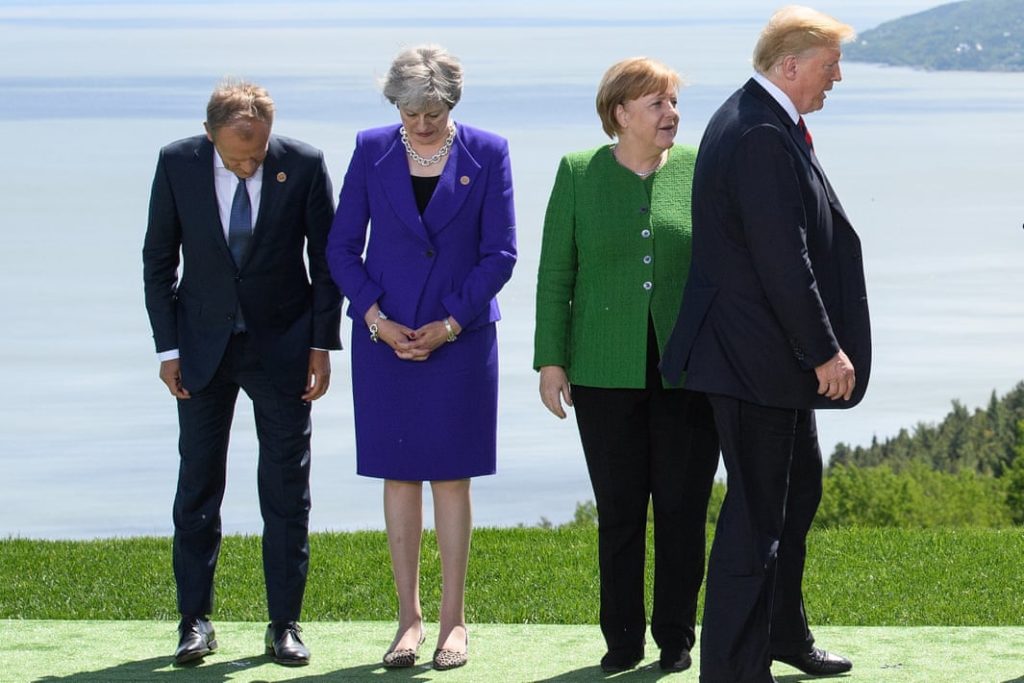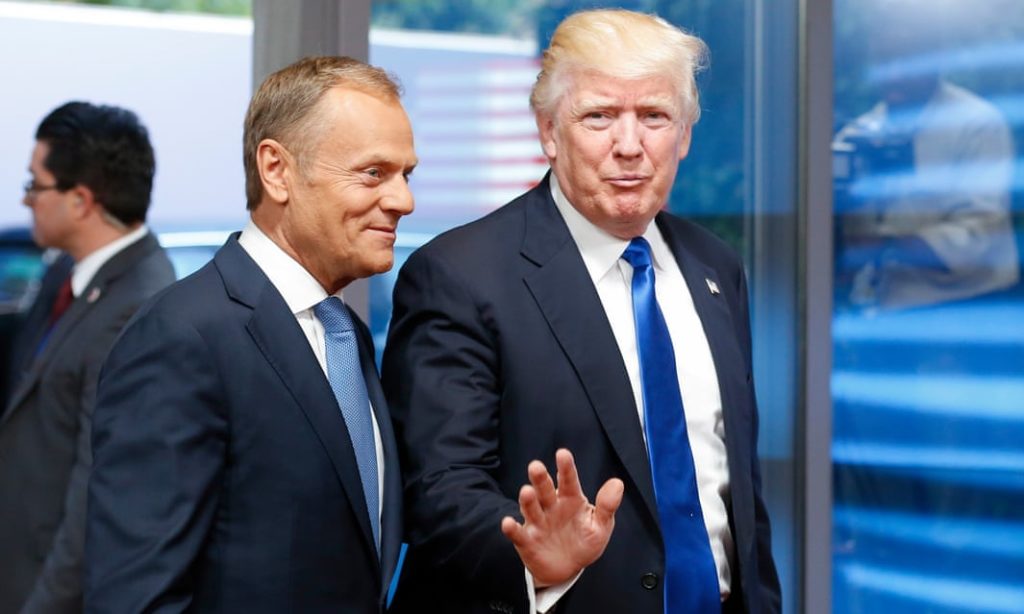The end of Atlanticism: has Trump killed the ideology that won the cold war?
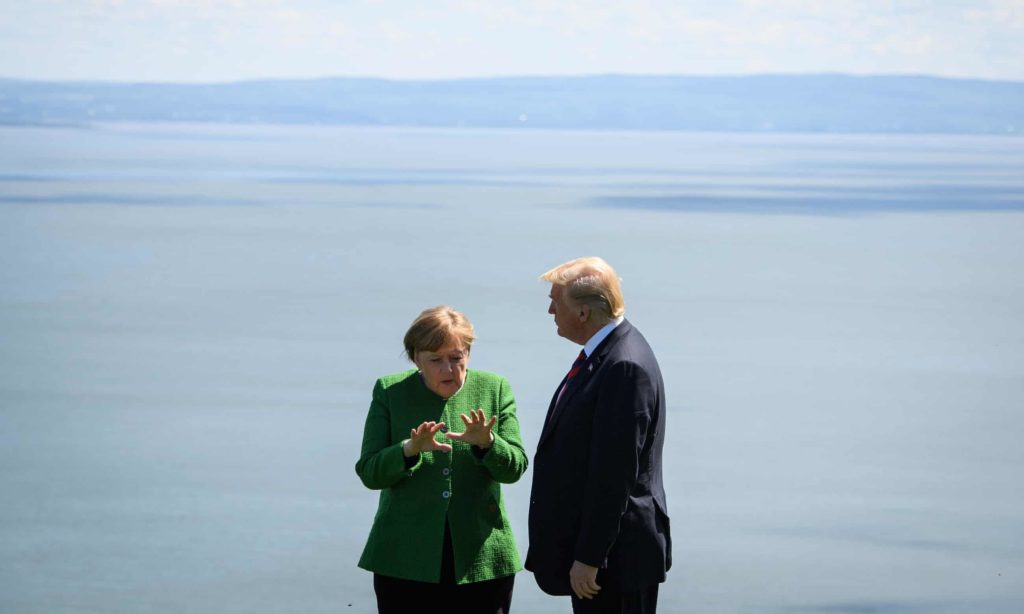
Angela Merkel and Donald Trump at the G7 summit, 2018.
Photo credit: Leon Neal/Getty Images
The foreign policy establishment has been lamenting its death for half a century. But Atlanticism has long been a convenient myth.
If you took headlines at their word, you would think that the western world is in freefall. As dozens of magazine articles, op-eds and blogposts will tell you, the post-second-world-war order was built – from D-day until yesterday – by Americans and Europeans who shared the ideals of peace, freedom and democracy. The system worked well until Donald Trump came along and knocked it down as if he were laying the foundations for a new casino.
This perceived crisis may be the main thing that unites the press in the United States and Europe. “Is the Trans-Atlantic Relationship Dead?” asked the New York Times in January. A few weeks later, it rang a more definite note: “The Post-World War II Order Is Under Assault From the Powers That Built It.” In Germany, the heart of the Europe-US alliance, there is talk of little else when it comes to foreign policy. A recent cover of the German weekly Der Spiegel showed a hand giving the finger, except that the finger was a little Trump. Two editors at the German newspaper Die Zeit argued that politicians had to accept that the relationship was over and move on. Too many, they argued, “refuse to accept this reality. Instead, they take refuge in argumentative acrobatics.”
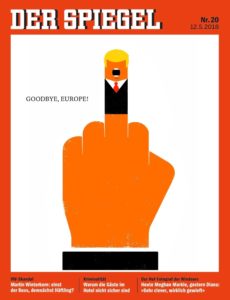
Der Spiegel: Goodbye Europe
The idea that the world’s stability and prosperity is defined primarily by a partnership between Europeans and Americans is called Atlanticism or transatlanticism, and the people who care about it are convinced that Trump is out to tear up the alliance. For the politicians, professors, thinktank pundits and journalists for whom “Atlanticist” is a badge of honour, an end to this partnership is not just a geopolitical issue, but a threat to liberalism and any hopes of political betterment around the world. Democracy, free speech, anti-totalitarianism, constitutionalism and free trade that manages to enrich all of its participants – these ideals, to the Atlanticists, depend on the close relationship between the US and Europe. As goes the transatlantic relationship, so goes the possibility of western progress.
At the heart of the crisis of transatlanticism is the legacy of the American effort to rebuild Europe after the second world war through three institutions: Bretton Woods, the Marshall plan and Nato. These were the foundations of the so-called “post-world order”, a programme to stabilise Europe and prevent the emergence of new forms of totalitarianism. (“Transatlanticism” sounded better than “denazification”.)
For the Atlanticists, these institutions were not only the means of shaping Europe after 1945, but an expression of the possibilities for idealistic American power. The high point of the relationship was the end of the cold war, when the opportunities that had shaped the west suddenly became available to the Soviet bloc, validating the Atlanticist strategy. Atlanticism could be a means of bringing the west to the rest, as some Atlanticists proposed in the heady years following the fall of the Berlin wall. No longer simply a response to crises, Atlanticism became a way of conceiving the world and the US’s place within it.
But has Trump really ruined the transatlantic relationship? Headlines since the 1960s would suggest the relationship declined long before he took office. “The widening Atlantic” and “Atlantis Lost” – these are titles of books and newspaper articles that have appeared for decades. Like a couple that thrives on breakups and resolutions, its crises only fuel its perceived importance. Already in 1965, Henry Kissinger, whose name figures prominently in the history of transatlanticism, wrote a book called The Troubled Partnership: A Reappraisal of the Atlantic Alliance that argued that the partnership between the US and Europe was under deep strain, then because of Charles de Gaulle. (The book was a flop. The only place it sold, Kissinger later joked, was at the bookstore that had mistakenly placed it on the relationships shelf.)
Why, then, has the idea of the transatlantic relationship as the axis of world stability stayed around? Since the mid-60s, many of the structures that formed the basis of the original “post-world order” have eroded or disappeared. The US no longer heaps billions of dollars in aid upon Europe, as it did before 1951; international currencies are no longer tied to an external monetary policy designed in New Hampshire, as they were before 1971; countries that were once part of the Soviet Union are themselves Nato members. Even as the alliance between the US and Europe has waned, the concept of a free world built on transatlantic pillars has lived on as a powerful political idea. This is not because of the partnership itself, poorly defined and shifting, as much an ideological construction as an institution. Is it possible that the panic about the collapse of Atlanticism is really a panic about who is in charge? Lurking underneath the turbulent Atlantic waters lies nostalgia for American power and the idea that a few well-educated men could ensure world security.
Before I arrived in Germany from New York last July, the word transatlantic was not part of my general vocabulary. But transatlanticism is everywhere in Berlin. Everyone I met in my new life as a journalist abroad seemed to be an emissary of the Atlantic project. At a dinner in the Berlin neighbourhood Schöneberg, I met a young woman who had travelled to Berlin to participate in a German Chancellor fellowship, a 12-month programme “with the aim of promoting the transatlantic partnership” and identifying “potential leaders”. Another friend became a member of the American Council on Germany, a non-profit founded in 1952 to “strengthen American-German relations”. Introductions at parties sounded like the index of a postwar European history book: Marshall Memorial fellowship, Transatlantic Media fellowship, the McCloy. I myself had travelled to Germany through one of these programmes: I had a fellowship from the Robert Bosch Stiftung, which describes itself as “a distinguished transatlantic initiative that offers a select cohort of accomplished Americans the opportunity to complete a comprehensive intercultural professional programme in Germany”.
I received weekly emails about “transatlantic must-reads” and weekly invitations to discussions of the present crisis (“Protecting transatlanticism in the rise of isolationism”), networking events (“We invite Fulbright alumni in the media to join us for a convivial exchange on current transatlantic developments”) or talks (“Transatlantic abnormality under Trump and the rift with Turkey – what to expect for 2018.”). In the glass-panelled atriums of foundation buildings, these events gathered thinktank employees and Americans wearing suits around open-faced sandwiches and the occasional bottle of juice. Ample time for card-swapping was a given. No matter the topic, the word “transatlanticism” added a sense of institutional importance: the discussion now reflected the stability of the world at large. “Iran and the Transatlantic relationship: does the nuclear deal stand a chance?” read the subject line of one email. Another promised: “The new populisms and nationalisms: transatlantic perspectives.”
These events depicted the same bleak reality. The transatlantic relationship was now in a precarious state. The thinktanks, especially, were eager to make this point. At the Brookings Institution, one of the many aggressively centrist factories for foreign policy wonkery that employ experts on both side of the Atlantic, an analyst wrote a big paper about how “normal is over” when it comes to US-EU relations: “The transatlantic divide has never been so stark.” At the German Marshall Fund (founded on the 25th anniversary of the Marshall plan to promote its principles), the same conversation had reached a state of despair. On the fund’s podcast, Brussels Sprouts, analysts talked about the mood at the most recent Brussels forum, their annual conference, as being “like a funeral march … It is a sober moment in transatlantic ties.” The US and Europe, the podcast described, were like a couple who had flunked out of marriage therapy. “There is a trust deficit right now in the transatlantic relationship. We know from our personal relationships that it’s very hard to build trust and very easy to destroy it,” said Karen Donfried, a former Obama policy adviser who now heads the organisation.
I hope I will not sound too much like a blinkered American when I say that the emphasis on the “relationship” with the US came as something of a surprise. It was hard to imagine walking into a party in Washington and listening to everyone discussing the finer points of German foreign policy. The relationship seemed poignantly asymmetrical. “You initiate most communication”, “he or she never returns the favour”, “you constantly feel stressed out” are three of eight painful signs that could mean you are in a one-sided relationship, according to a blogpost I read that year, which seemed to describe the feelings in Berlin as much as any doomed romance.
The cover of Die Zeit, 31 October 2013.
Photo credit: Alamy Stock Photo
These discussions revealed something more telling: no one could define the transatlantic relationship. There is Nato, of course, an institution with buildings and policies and weapons. But when people referred to transatlanticism, they seemed to be describing something bigger – a culture rather than an organisation. But what is it? Trotz alledem: Amerika (“Despite it all: America”) wrote a group of German thinktank experts last autumn, arguing that although Trump is the first US president since the second world war to fundamentally question the liberal international order, Germany’s relationship with the US remained the cornerstone of its foreign policy. It set up a website with a big picture of calm, endless ocean. But it could not define the transatlantic relationship. “The liberal world order with its foundation in multilateralism, its global norms and values, its open societies and markets – is in danger,” the thinktank said in a statement.
But if shared values and norms are the foundation of the liberal world order, what are they? The US and Germany, to use the example of two countries on either side of the Atlantic, are both representative democracies, that is true. It does not take a lot of digging to see clear differences in norms and values in their political systems: gun laws in Germany are strict, and not in the US; hate speech is allowed in the US and not in Germany; Germany has a strong social welfare system and the US does not; the postwar German political system is set up to avoid concentration of power while the American one apparently allows for a rather swift takeover. Germans tolerate public nudity, Americans do not. And so on. Yes, both countries value “freedom” and “democracy”, but their systems seem most aligned when viewed in the abstract, or across an ocean.
Atlanticism has never had a very stable meaning. For one thing, the US and Europe have not always considered each other natural political partners. For most of American history, there hasn’t even been a unified “Europe” to partner with.
The idea of a political alliance between the US, Britain and France emerged shortly before the first world war, against rumbling threats of communism and growing German power. One figure who did much to popularise the notion of the US’s European commitments was Walter Lippmann, the founder of the New Republic, then an influential Washington magazine with close ties to the government. In a 1917 paper, and again in US Foreign Policy: Shield of the Republic, published in 1943, Lippmann described the importance of an “Atlantic community” whose main enemy was Germany. Britain, Spain, Portugal, the Netherlands, France, Belgium, Denmark and Norway were “vitally involved in the system of security to which we belong” and therefore the US’s natural partners. He later expanded the list to include Sweden, Greece, Italy and Switzerland. He excluded eastern European states recently liberated by Germans from the Soviets. Their commitment could not be counted on. Other thinkers echoed Lippmann’s ideas. In the 1939 bestseller Union Now, journalist Clarence Streit argued for a federation of 15 nation-states spanning from the US to New Zealand.
The founding documents of Atlanticism – the Atlantic charter, an outline of the Allied goals and policy, signed in 1941 by Franklin D Roosevelt and Winston Churchill, and the North Atlantic Treaty, the basis of Nato, signed in 1949 – drew on the work of Lippmann and Streit to envision a security alliance between certain European countries and the US. As American, British and French leaders came together at distinct moments to draft these documents, they also put in place a monetary system, Bretton Woods, designed to govern monetary relations between the US, Canada, western Europe and Japan, and a means of rebuilding Europe, the Marshall plan. It is this system that forms the basis of the “postwar liberal world order”.
Of course, institutions are more appealing if they seem like blueprints for utopia and not just a way to suppress new forms of despotism. (Even bureaucrats would rather see themselves as visionaries than rule-makers.) Atlanticism was the basis for a security mission, Nato, but it was also meant to describe a culture: the supposed affinity of the US and Europe. The US and Europe were to be bound by their shared values and history. “The parties to this treaty … are determined to safeguard the freedom, common heritage and civilisation of their peoples, founded on the principles of democracy, individual liberty and the rule of law,” declared the countries that signed the original Nato agreement.
President of the European council Donald Tusk, Theresa May,
Angela Merkel andDonald Trump at the G7 summit, 2018.
Photo credit: Getty
What exactly was the shared culture of Atlanticism, and who was sharing it? The general goal of Nato was “to keep the Russians out, the Americans in and the Germans down”, as Hastings Ismay, Churchill’s chief assistant and the first secretary general of the organisation, is said to have quipped. The Marshall plan, a cornerstone of Atlanticism, had a strong ideological component meant to promote certain values precisely because they were not shared. In videos, posters, classes and institutions promoting capitalism over state-controlled markets, it sought to diffuse what it claimed was the American value of hard work over the Soviet threat. In exchange, Europe got money, protection and peace.
The legacy of these institutions looms large because they were real achievements, high points of American diplomacy, cooperation and idealism. But these institutions were not static, and it is a common fallacy of accounts of the postwar international order to describe them as bastions of stability. American historians point to the early 1960s as the height of the Atlantic alliance. John F Kennedy argued for a “declaration of interdependence” with Europe on 4 July 1962. Standing in Philadelphia’s Independence Hall, where the first American declaration had been signed, he called for a “concrete Atlantic partnership”. When Kennedy was assassinated the following year, “the Atlantic community was gone in a flash”, wrote historian Frank Costigliola.
Meanwhile, as Europe became stronger and the need for American assistance shifted, the institutions at the centre of the Atlantic alliance also changed. The creation of the European Economic Community (EEC) in 1957 and, later, the European Union, lent credence to arguments that Atlanticism could not be driven by American interests alone. Jean Monnet, one of the founders of the EEC, argued for a “dumbbell” approach to transatlanticism, in which both Europe and American interests would be weighed equally. He was not successful. De Gaulle withdrew France from Nato military command structure in 1966 and advocated for French nuclear independence. The Bretton Woods system collapsed in the 1970s, bringing an end to one of the postwar institutions that had sought to instil Atlantic order over the world.
As the pillars of Atlanticism began to wobble, it became harder to say what Atlanticism really was. A Carnegie Endowment for International Peace paper from 1962 wasn’t sure: “It is sometimes used to refer to an extension of the Nato concept, adding economic, cultural and, perhaps, political dimensions to the existing partnership. At other times, it refers to long-range aspirations, as yet not officially expressed, to create a closer economic and political community, perhaps with constitutional implications, among the nations bordering the Atlantic. The phrase is also used in connection with efforts to strengthen the relations between the western allies by short-term programmes, particularly in the educational and cultural fields. Even the geographic area of the Atlantic community is imprecise, some taking it to include Latin America, others limiting it to western Europe and North America.”
In 1973, Henry Kissinger, himself a transatlantic refugee, launched a “Year of Europe” tour to try to save the relationship in the name of containment, preventing the further growth of the Soviet Union. Speaking as Nixon’s national security adviser, he asked whether the Atlantic community could thrive as the memory of the second world war began to fade. As the “rigid divisions of the past two decades diminish, new assertions of national identity and national rivalry emerge”. He argued that Americans should continue to support European unity. “If we permit the Atlantic partnership to atrophy … we shall miss our historic opportunity for even greater achievement.”
The speech was not a success. European leaders seized on a line mentioning the continent’s “regional role” and the American’s “global” one. “It may not have been wise to make reality explicit, but European carping over the phraseology represented a mix of hypocrisy and subterfuge,” Kissinger later claimed. When German chancellor Willy Brandt came to visit some months later, Nixon looked distracted and Brandt turned petty, Kissinger complained. Yet even in this attempted reassertion of the Atlantic community it was hard to pin down exactly what this community was to be based on: values? If so, which? Territory? If so, where? One of Kissinger’s points was to encourage the entry of Japan into the Atlantic community.
If Atlanticism does have one stable, consistent characteristic, it is that for the past 50 years, it has been on the point of collapse. Invocations of the Atlantic relationship have come twinned with panics about its endangerment and decline in books and articles such as The Limits of Atlanticism, The End of Atlanticism, The End of the West?: Crisis and Change in the Atlantic Order, as historians Valérie Aubourg and Giles Scott-Smith have shown.
The relationship between the US and Europe has ping-ponged between reluctant love and hate. George HW Bush angered European allies with war in the Gulf. Clinton showed his Atlantic commitment to Nato with Bosnian airstrikes, while George W Bush invaded Iraq and nearly tore the alliance apart.
Before the latest crisis arrived in the form of Donald Trump, the Iraq war was the last moment where commentators rushed to declare that transatlanticism was at “breaking point”. The Brookings Institution produced a paper describing “very serious trouble” and a “tipping point.” “Sometimes even the best of marriages end in divorce,” the paper continued. Policy experts agreed that part of the blame should be cast on a rude American president acting unilaterally. “The swagger, pugnacious language and the deep religiosity of his main message strikes Europeans as profoundly foreign,” the Brookings paper suggested.
On both sides of the Atlantic, Europeans and Americans worried that the partnership was breaking up. (Even in the US, the pesky question of who was part of the Atlantic community went mostly unaddressed. After all, responses to the war did not fall neatly along geographic lines. While most of Europe opposed the invasion of Iraq, the UK and Poland were key US allies.)
Barack Obama’s election smoothed things over. He knew how to call up Atlantic nostalgia when necessary. “Look at Berlin,” he said in the first of three speeches he would give at the Brandenburg Gate. “The determination of a people met the generosity of the Marshall plan and created a German miracle; where a victory over tyranny gave rise to Nato, the greatest alliance ever formed to defend our common security.” Not that Obama’s policy was itself particularly transatlantic. One of his central policy points was a “pivot to Asia”.
In this context, Europe’s reaction to Trump is not an exceptional instance of diplomatic history but the usual response to a particular strain of American exceptionalism. Trump’s unilateral views, his boorishness and his “swagger” are aggressive and dangerous, but they are not entirely new.
Donald Tusk and Donald Trump.
Photo credit: Xinhua/Barcroft Images
If transatlanticism continues to have a powerful hold on the foreign policy imagination, it is not because of presidents shaking hands with prime ministers. The relationship thrives in the many networks rallying for its existence in the face of possible decline. “By 1965 it was possible to list 10 major private groupings which had worked or were still working to promote the Atlantic idea,” historian David Ellwood has written, including the Atlantic Treaty Association, the Bilderberg Group and the Atlantic Institute in Paris. Some of these organisations have long shut their doors, but many still publish papers and sponsor research. As Harvard history professor Charles Maier has argued, Atlanticism brought with it a “new Atlantic elite”. “Transatlantic trips, common foreign policy forums, a network of clubby associations for talk and mutual self-regard created in effect a transnational ruling group … The most prominent members of the Atlantic elite achieved semi-sacral status: Marshall, McCloy, Lovett, Spaak, Monnet, and other ‘wise men’ who exhorted to common effort and cooperation.”
It is in these kinds of networks that the transatlantic partnership still flourishes: in exchanges, meet-and-greet events, leadership programmes, fellowships. Self-reflexive and defined in part by self-preservation, these institutions push the idea of European-American relations as the central axis of world power. In the language of thinktanks and funds, “Atlantic” designates not a real set of values so much as an empty form that can be filled with whatever meaning its organisers want: liberal democracy, the diplomatic partnership between the US and Europe, or the simple continuation of structures set up after the second world war and not redefined since.
It is hard not to see more than an ounce (or a gram) of nostalgia in the language of these institutions. We did the Marshall plan. Trust us. It is maybe for this reason that the Atlantic outlook has remained fixed in a changing world. Policy is no longer driven by “Atlantic” interests alone: Pacific powers have become far stronger than they were in the 1940s. What important global policy decisions can be made today without consideration of China or India? Yet a fixation on the networks of old persists, because what remains when ideas are never defined, positions not reassessed, are just networks. The dream of Atlanticism is in part that as the world changes, the location of power has not. Americans and Europeans can carry on as before. Diplomacy and leadership need not be altered because they have worked so well in the past.
At a German-American conference hosted by the Atlantik Bruecke (Atlantic Bridge) and the American Council on Germany in the spring of 2017, then German foreign minister Sigmar Gabriel gave a speech defending the legacy of the Marshall plan. Gabriel told assembled participants that the future of Atlanticism was in their hands. “We have to roll up our sleeves and get to work, on both sides of the Atlantic,” he said. It was seemingly without irony that he noted an increasing “alienation” within both European and American societies. “We must get those parts of our societies in touch with one another that do not congregate in the Frankfurt airport frequent flyer lounge, or at Dulles International airport.” (He did not question how he had come to address a group that did, in fact, mostly gather among Tumi carry-ons, clutching copies of the Harvard Business Review.)
What was Gabriel’s vision of Atlanticism comprised of? Values and norms, of course. He cited the helpfully vague trio beloved of Atlanticists: “True western values: human rights, democracy and the rule of law.”
The vestiges of the Marshall plan are visible everywhere in Germany. Travelling around the country, especially in its western half, one could be mistaken for thinking it the last American colonial outpost: a Kennedystrasse in every town; a “German-American centre” on every Kennedystrasse. Western Germany is filled with government halls and conference centres built with funding from the Marshall plan and the US, flat, utilitarian and clean. Where American policymakers propose “wars” on drugs, on crime, on poverty, German policymakers propose “Marshall plans”.
For the decades after the second world war, these libraries and cultural centres brought American books and movies and culture into Germany. They were the quiet myrmidons of what Harvard professor Joseph Nye called “soft power”, persuasion through cultural influence rather than brute force.
These institutions no longer serve that purpose. Now you do not need to go the American Memorial Library in Berlin to see what new books are being published in the US. Instead, these institutions serve as a place where anxious Germans go to vent their fears about what is happening in the US, a sort of town hall meeting space, but for another country. There, Europeans can ask how the America they were promised turned into the America they see. At the Institute for Foreign Cultural Relations in Stuttgart last year, I watched a worried crowd ask the American consul if Trump really hated them. Did the president really want to forsake Germany as an ally? Couldn’t he call Angela Merkel, like Obama did? Why had he told other European leaders in Brussels that the Germans were “bad, very bad” and tweeted angrily about the trade deficit? Don’t read Twitter, counselled the consul.
No matter how quickly the world changes, Atlanticism can endure, not as a reflection of politics as they are but as a tacit prescription of who should be in charge. This autumn, Trump will offend the US’s European allies, German politicians will call for a “new world order” and Merkel will quiet these attempts. And if you go to the German-American Center in Stuttgart, one of the city’s transatlantic institutes, you can attend Transatlantic ArtConneXion, an event for “Americans and Germans active in the art scene”, meet the Baltimore Beauties, an “international, multilingual hand-sewing quilting, knitting and crocheting group” and sit in on the Empire study group: “a monthly exploration of the US’s global interests and burdens”.
Whatever happens in the most recent crisis, there will still be Atlanticism, a nebulous set of ideals harking back to the end of the second world war. Its vagueness is too useful: political opportunism dignified with the weight of history.
Use article 7 against my country
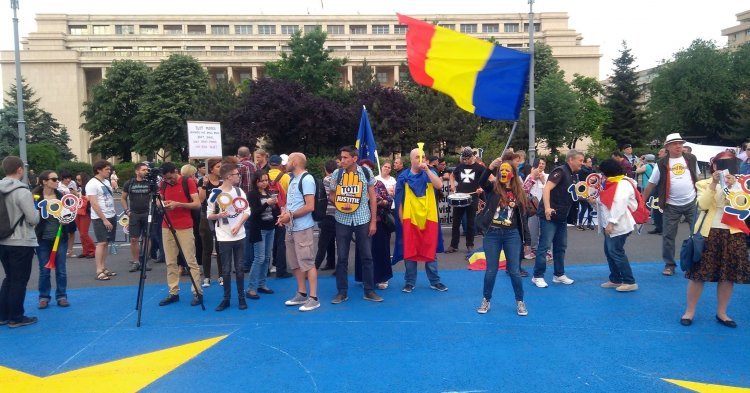
Photo credit: Radu Dumitrescu
On the 1st of January 2019, my country is set to take over the rotating presidency of the Council of the European Union, the first time since it joined the European Union in 2007. For over a year now, the political sphere of Romania has been filled with calls for the opposition and governing parties alike to band together in order to further the “national interests and agenda” of Romania as it holds the presidency.
Protests and ordinances
In the meantime, however, the S&D-ALDE government has routinely used such calls for unity in order to silence criticism of its acts – among which a vast, prolonged and ongoing alteration of the laws concerning the functioning of the judiciary, which empowered the minister of justice and granted him control over supposedly independent prosecutors. The same changes would mean that the president of the Social Democratic party of Romania, the twice-convicted (but somehow still president of the Chamber of Deputies) Liviu Dragnea, would walk scot-free.
Two years ago, protests sprung up in opposition to such changes, the most famous of which being Emergency Ordinance 13, which set out to virtually decriminalise official misconduct in cases where the damage to the public finances was less than €42,000. The largest protests ever since the 1989 revolution followed, with crowds dotted by European flags and cries for “Mutter Merkel” to help. Then came the violent crackdown of the police against the protests on the 10th of August 2018, during which the Romanian Gendarmerie freely made use of gas and violence, hospitalizing some 500 people and attracting the criticism of the European Commission, the US State Department, and other external partners.
Coming back to now – this month, at the 12th hour, it has become clear that Romania cannot successfully fulfill the demands required by the presidency of the European Council. The president, ever at odds with the government, argued as much, causing panic throughout European capitals.
“…it has become clear that Romania cannot successfully fulfill the demands required by the presidency of the European Council. The president, ever at odds with the government, argued as much, causing panic throughout European capitals.”
There is no plan, there is no competence – since professionalism and competence are ill-regarded by the One Party. Then the minister in charge of EU Affairs, perhaps one of the most competent members of an otherwise shameful cabinet of populists and cronies, resigned or was forced out, in just another of PSD’s behind-the-scene scandals – the same party which removed two prime ministers due to the fact that they proved unwilling to obey Dragnea.
Roexit?
Romania is a rare specimen in the European family, in the sense that it has no visible Eurosceptic party, be it far-left or far-right. For that matter, it doesn’t have much of a far-left or a far-right. Part of the reason is that the mainstream, governing Social-Democrats have so enveloped the electorate likely to listen to such nationalistic, xenophobic or anti-EU calls with a thinly veiled economic and nationalist populism that there is no room for typical extremist parties. So far, PSD has managed to control its elderly, rural and less-educated voters, but the recent spat with Brussels may convince the pragmatic Social Democratic leaders that the time has come to turn on the throttle of Euroscepticism and nationalism. Already, the more daring left MPs have started speaking of a “Romanian civilization” that is superior to that of Western Europe.
It has become clear that the PSD-ALDE government of Romania is not interested in hearing feedback from its people or its external partners. While it treats the latter to lies of cooperation, domestic peace and rule of law, it sends the police to trample and gas the former. The recent report within the Mechanism for Cooperation and Verification – painted as an anti-Romania conspiracy by PSD mouthpieces – which monitors the rule of law within Romania and Bulgaria, has scolded the first while praising the second, in a role-reverse that has occurred since PSD re-took power in 2016 and set out to dismantle any form of judicial independence.
For all of these reasons, the only solution to deal with Romania’s rogue, mob-run government is for Brussels to active Article 7 and leave the country without EU funds – which support over 60% of the public investments being made in Romania, as the state budget is squandered on pensions and the ever-rising paychecks of public workers – or voting rights.
“For all of these reasons, the only solution to deal with Romania’s rogue, mob-run government is for Brussels to active Article 7 and leave the country without EU funds”
Article 7 and treason
To remind the readers, Article 7 of the Treaty of the European Union represents an infringement procedure that condemns and then sanctions member states for their violation of the fundamental rights guaranteed by the EU. It was introduced in order to allow the Union to deal with countries and leaders that were governed by xenophobia and autocratic tendencies, such as present-day Hungary and Poland. The conclusion of the application of Article 7 would render a state without voting rights in the European Council.
These days, a debate roars throughout Romania – is it treason for Romanian MEPs to unveil the Romanian government’s wrongdoings before the European Parliament and the Commission? Such a question runs deep within pro-Europeans, and federalists most of all, and the answer is plainly obvious – of course not!
“A country’s government is not its people, and any criticism directed at it is not meant for the entire country. To argue otherwise is to misrepresent what the EU stands for and how the democratic system of government functions.”
A country’s government is not its people, and any criticism directed at it is not meant for the entire country. To argue otherwise is to misrepresent what the EU stands for and how the democratic system of government functions. And that is exactly what populists and nationalists bring before the electorate – hatred, fear and lies, while grabbing as much as they can out of the EU funds. We have seen it in Hungary, we have seen it in Poland, and now it is there for everyone to see in Romania.
So use Article 7 against my country. Skip us, for the moment, when it comes to the presidency of the Council of the EU. Leave us without voting rights. Take away the funds, lest they fall within the greedy hands of the corrupt, whom the fearful and the ignorant keep in power because they wave the flag and point at the foreigners. Moreover, remove PSD and their ALDE allies from their respective European families, even at a steep electoral cost.
“So use Article 7 against my country. Skip us, for the moment, when it comes to the presidency of the Council of the EU.”
To my countrymen, I say this – you are being manipulated by a false sense of unity invoked by those who kept you in poverty and ignorance since 1989. To love your country does not mean to defend its crooks in front of prying foreign eyes. It means doing everything to rid your community of them, so you can finally stand upright as a member of the European family. Corruption is not the national shame, it’s the national disease. This time, however, we are not alone against it – and Brussels is the cure.


